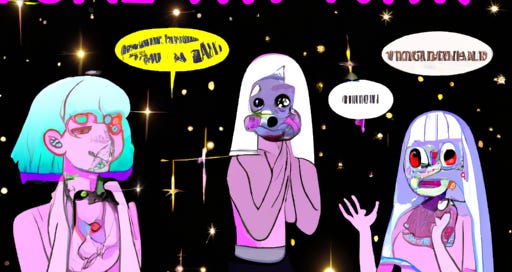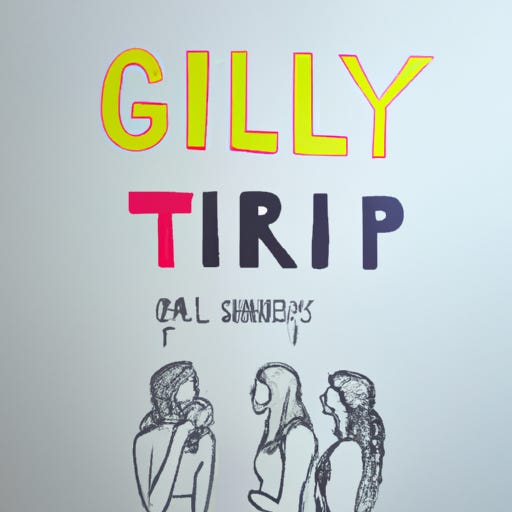"How to Talk to Girls at Parties" (2006) by Neil Gaiman
Alien Contact (2011) Edited by Marty Halpern
Readers unfamiliar with "How to Talk to Girls at Parties" may prefer to read these notes only after reading the story.
[….] a friend had told Vic about a party, and Vic was determined to go whether I liked it or not, and I didn't. But my parents were away that week at a conference, and I was Vic's guest at his house, so I was trailing along beside him.
"It'll be the same as it always is," I said. "After an hour you'll be off somewhere snogging the prettiest girl at the party, and I'll be in the kitchen listening to somebody's mum going on about politics or poetry or something...."
"They're just girls," said Vic. "They don't come from another planet."
"How to Talk to Girls at Parties" has fun with the horror-show aspects of puberty and adolescence for boys crossing the border to early manhood. Narrator Enn, groping his way through a land unknown, is continually outshone by his friend Vic, who is blessed with the gift of gab and--until the summer night on which our story takes place--no self-consciousness about his behavior.
The story takes place in the late 1970s UK.
[….] This was during the early days of punk. On our own record players we would play the Adverts and the Jam, the Stranglers and the Clash and the Sex Pistols. At other people's parties you'd hear ELO or 10cc or even Roxy Music. Maybe some Bowie, if you were lucky. During the German exchange, the only LP that we had all been able to agree on was Neil Young's Harvest, and his song "Heart of Gold" had threaded through the trip like a refrain: I crossed the ocean for a heart of gold. . . .
The music playing in that front room wasn't anything I recognized.
It sounded a bit like a German electronic pop group called Kraftwerk, and a bit like an LP I'd been given for my last birthday, of strange sounds made by the BBC Radiophonic Workshop. The music had a beat, though, and the half- dozen girls in that room were moving gently to it...
While the girls at the party move to their music without issue, most of the ones Enn interacts with talk about things completely alien to him. This is no surprise to the reader. Earlier Enn has fumed:
[….] when you start out as kids you're just boys and girls, going through time at the same speed, and you're all five, or seven, or eleven, together. And then one day there's a lurch and the girls just sort of sprint off into the future ahead of you, and they know all about everything, and they have periods and breasts and makeup and God-only-knew-what-else -- for I certainly didn't. The diagrams in biology textbooks were no substitute for being, in a very real sense, young adults. And the girls of our age were.
Enn makes his way through the house, which turns out to be larger on the inside as well as occupied exclusively by young women.
A girl was the only occupant of the conservatory. Her hair was so fair it was white, and long, and straight, and she sat at the glass-topped table, her hands clasped together, staring at the garden outside, and the gathering dusk. She seemed wistful.
"Do you mind if I sit here?" I asked, gesturing with my cup. She shook her head, and then followed it up with a shrug, to indicate that it was all the same to her. I sat down.
Vic walked past the conservatory door. He was talking to Stella, but he looked in at me, sitting at the table, wrapped in shyness and awkwardness, and he opened and closed his hand in a parody of a speaking mouth. Talk. Right.
"Are you from around here?" I asked the girl.
She shook her head. She wore a low-cut silvery top, and I tried not to stare at the swell of her breasts.
I said, "What's your name? I'm Enn."
"Wain's Wain," she said, or something that sounded like it. "I'm a second."
"That's uh. That's a different name."
She fixed me with huge, liquid eyes. "It indicates that my progenitor was also Wain, and that I am obliged to report back to her. I may not breed."
"Ah. Well. Bit early for that anyway, isn't it?"
She unclasped her hands, raised them above the table, spread her fingers. "You see?" The little finger on her left hand was crooked, and it bifurcated at the top, splitting into two smaller fingertips. A minor deformity. "When I was finished a decision was needed. Would I be retained, or eliminated? I was fortunate that the decision was with me. Now, I travel, while my more perfect sisters remain at home in stasis. They were firsts. I am a second.
Soon I must return to Wain, and tell her all I have seen. All my impressions of this place of yours."
"I don't actually live in Croydon," I said. "I don't come from here." I wondered if she was American. I had no idea what she was talking about.
"As you say," she agreed, "neither of us comes from here." She folded her six- fingered left hand beneath her right, as if tucking it out of sight. "I had expected it to be bigger, and cleaner, and more colorful. But still, it is a jewel."
She yawned, covered her mouth with her right hand, only for a moment, before it was back on the table again. "I grow weary of the journeying, and I wish sometimes that it would end. On a street in Rio at Carnival, I saw them on a bridge, golden and tall and insect-eyed and winged, and elated I almost ran to greet them, before I saw that they were only people in costumes. I said to Hola Colt, 'Why do they try so hard to look like us?' and Hola Colt replied, 'Because they hate themselves, all shades of pink and brown, and so small.' It is what I experience, even me, and I am not grown. It is like a world of children, or of elves." Then she smiled, and said, "It was a good thing they could not any of them see Hola Colt."
"Um," I said, "do you want to dance?"
She shook her head immediately. "It is not permitted," she said. "I can do nothing that might cause damage to property. I am Wain's.
"Would you like something to drink, then?"
"Water," she said.
I went back to the kitchen and poured myself another Coke, and filled a cup with water from the tap. From the kitchen back to the hall, and from there into the conservatory, but now it was quite empty.
There are several more droll interactions before Vic comes downstairs, grabs Enn, and pushes him out the door.
[….] we did not stop until we could not breathe; and then we stopped and panted, unable to run any longer. We were in pain. I held on to a wall, and Vic threw up, hard and long, into the gutter.
He wiped his mouth.
"She wasn't a--" He stopped.
He shook his head.
Then he said, "You know . . . I think there's a thing. When you've gone as far as you dare. And if you go any further, you wouldn't be you anymore? You'd be the person who'd done that? The places you just can't go. . . . I think that happened to me tonight."
I thought I knew what he was saying. "Screw her, you mean?" I said.
He rammed a knuckle hard against my temple, and twisted it violently. I wondered if I was going to have to fight him -- and lose -- but after a moment he lowered his hand and moved away from me, making a low, gulping noise....
* * *
Enn feels himself very far from the end of adolescence, that haphazard "piecing together of dissociated knowledge." It is an impossibly distant plateau.
At the end of the story, though Enn does not realize it, Vic has seen something of the "terrifying vistas of reality, and of our frightful position therein," though he seems safe from the risk of fleeing from the light "into the peace and safety of a new dark age." Perhaps within a decade Vic will make it to adulthood: a dad, husband, householder.
I did not go to an all-boy school like Vic and Enn, but I did have (and still have) severe social skill disabilities. The leap from such personal existential horror and dysphoria to an appreciation of cosmic horror turns out to be one very small step.
Jay







